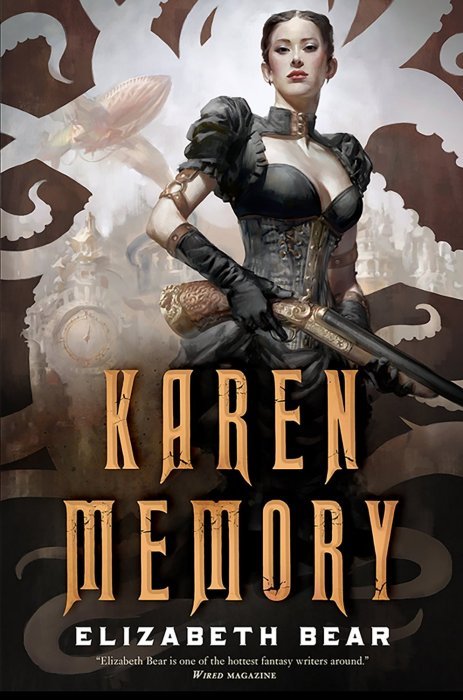Call it what you will: a bordello, a brothel, or a whorehouse. No matter what your name for it, a building that holds prostitutes (or courtesans, Companions, or soiled doves) is a vital part of scenery for certain genres. Westerns in particular spring to mind, though I will admit that most of my knowledge of those comes from Firefly rather than cowboy movies. Still, some cultural knowledge must have seeped into my SFF-obsessed adolescence, because when I think of a Western-set town, the bordello is right there with the saloon and the sheriff’s office, complete with women dressed in mid to late 1800s dresses leaning seductively against the front door. Most of these buildings are only seen from the outside, experienced through the eyes of the (male) protagonist. Karen Memory is a brilliant new take on this setting, one which turns it completely on its head.
For one thing, the novel is set within the bordello, and every man who passes through the doors is a secondary character, even though many of them would be perfect protagonists for another Western. The novel instead focuses on the women there, especially Karen Memery, the orphaned daughter of a horse trainer who, like so many of her colleagues, is saving her money for a chance to get out. Things go awry when a Chinese girl called Merry Lee arrives in the dead of night with a bleeding Indian girl. The girl turns out to be indentured to a man known for mistreating his prostitutes, and he and Madam Damnable, the woman in charge of the Hôtel Mon Cherie where Karen works, quickly become involved in a feud over where the girl belongs.
The book turns its setting on its head in another way, too, though readers of this site may already have partially guessed it. Karen’s Hôtel Mon Cherie isn’t set in the world we know. Neither is it set in what could be considered a traditional steampunk Western, though the book is rich with steam-powered sewing machines and airships. Rather than being in the Wild West, it is set in Seattle of 1878, with prospectors heading to Alaska to seek gold and a threat from Russia hanging in the backdrop. It’s refreshing to read a Western set somewhere besides the windswept, drought-stricken prairie, and I reveled in the city streets.
But back to the plot. Like Firefly, the women of the novel are distinct and delightful. Also like Firefly (or at least like the pilot), the plot is constructed such that something is constantly happening, and just when you’ve started to forget one of the strands, it weaves itself right back into the braid of the narrative in a natural way. The Indian girl is only one of these many strands. There is also a mayoral race for Seattle (along with some commentary on the Republicans and Democrats of the time, who were quite different from the current American political parties) and a shadowy killer who strikes in the style of Jack the Ripper. Considering the current mayor is a patron of the Hôtel Mon Cherie and the first streetwalker’s body is discovered near the Hôtel, both of these quickly become personal for Karen, as does the matter of the Indian girl… though that is for a very different reason.
Yes, we’re back to my favorite subject: representation. Karen is a lesbian, and she isn’t the only minority character. Many of the prostitutes are women of color, and one is a transgender woman. Bass Reeves, an African-American US Marshal, appears in the novel, hunting the man who has been killing prostitutes, and he is accompanied by his friend, a Comanche. Karen takes all of this in stride, which is the one thing I feel torn over. On the one hand, it can be hard to believe that a woman brought up in 1800s Seattle would be so open-minded. On the other, it can be exhausting to constantly read about tragic queer characters, no matter how historically accurate that might be. Besides, when it comes to a novel where even a sewing machine can be a mecha, historical accuracy may be at a premium.
But then, if you’re reading steampunk, you likely already know that, and in a novel where a man may use a machine to influence others’ minds, who would bat an eye at a lesbian who is content with her sexuality? People read these sorts of books to escape, for a time, from the ordinary, banal world we find ourselves in all too often. We all should have a chance to see those like us as heroes.
Karen Memory is the sort of book I’d like to write someday, and the sort I wish I could read more often. If you need to lose yourself in a story that will have your pulse racing, take a look and suspend your disbelief for a while. It will be well worth it.



On the one hand, it can be hard to believe that a woman brought up in 1800s Seattle would be so open-minded.
I actually like the take on fantasy that does not share the same intolerances as this world. I mean as you wrote, it’s not 1800s Seattle in this world but a totally made up timeline/world. I don’t like that LGBTQ+ issues or PoC-characters always has to problematic in a negative way in every fantasy/scifi-world.